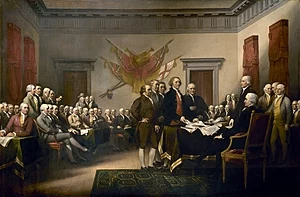Two and a half centuries ago, the American ruling Authority “marched into Lexington and Concord intending to suppress the possibility of rebellion by seizing weapons from the colonists.” The armed aggression against the citizenry did not have the intended effect; as it has been since our species first arrived in the Universal timeline, wherever we are confronted with violence and aggression, our survival instincts compel us, whatever the cost, to stand against it in defiance.
What happened in 1775 was not an “American thing,” and neither was it a protest against government action that a handful of people made some noise about. As a perfect display of Natural Law at its most primordial core, when threatened with losing the ability to defend themselves against violence and harm, that moment in history should have served as a reminder to people in power that humankind can only be pushed so far before they are left with no choice but to defend themselves. The king of England and his Parliament chose to ignore the warning and would go on to lose America’s war for independence from his tyranny and oppression.
While the story of America’s fight against a tyrannical King might be well known in the modern era, the story of kings and emperors and presidents and Pharaohs pushing their people, eventually, beyond the point of their willingness to be subjected to such treatment has been around since there have been kings and emperors and presidents and Pharaohs. In every case, it can be said that the civilizations that have risen and fallen have done so because of the vanities and self-indulgences of those in power.
History tells us this dates back to at least 2300 BCE with the rise of the presumed very first king- Sargon of Akkad – who rose to power in Mesopotamia, where it is said the first sedentary communities began to appear several centuries before Sargon’s rise.
In the five millennia since that time, there have been kings and emperors and presidents and Pharaohs, but after a century and a half of America being built from the ground up by the people living here and after relentless abuses of them by the king and Parliament, the founding fathers (themselves, Collectively, great students of History) had decided it was time to devise a system of governance that provided for the people actually doing the work of building and sustaining the Nation to be in control of running it and tending to their own affairs.
In Thomas Paine’s “Common Sense” (1775), written to address common people directly, he discussed at some length just how much the effect of British rule over their lives was responsible for so many of their problems. In the introduction, he made an observation, two and a half centuries ago that is every bit as relevant today:
“The cause of America is in a great measure the cause of all mankind. Many circumstances hath, and will arise, which are not local, but universal, and through which the principles of all Lovers of Mankind are affected, and in the Event of which, their Affections are interested. The laying a Country desolate with Fire and Sword, declaring War against the natural rights of all Mankind, and extirpating the Defenders thereof from the Face of the Earth, is the Concern of every Man to whom Nature hath given the Power of feeling; of which Class, regardless of Party Censure, is the Author.”
In the days of Thomas Paine, a self-made Nation revolted against a governing system that had little respect for Human Nature or the God-given rights our species is born with, independent of any rights a governing body presumes to hold a higher power to circumvent or overrule. Two and a half centuries later, in many ways, we are right back where we started: where a long train of abuses and usurpations, committed by a king and his Parliament with a design to reduce the people under absolute Despotism, we, the People, now face the same calamity from a president and a congress we designed and implemented precisely to ensure that no such thing would ever happen again.
What follows could be nicknamed “Common Sense 2.0,” but given that the breadth and scope of the problems that have arisen as this notion of a so-called “New World Order” now pervades the lives and livelihoods of humankind on a global scale, Human Sense” is a better fit and is well supported by Paine’s observation that “The cause of America is in a great measure the cause of all mankind.”






Huzzah. We are back on the same page
Great minds, my friend, great minds…